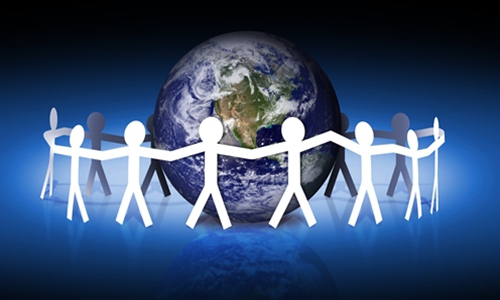HOME >> OPINION
Humanity’s shared destiny must include global health security
By Ruan Zongze Source:Global Times Published: 2020/3/29 16:48:40

Photo: IC
Globalization has shrunk the world into a global village in which we all share a common future. Raising this awareness will help us win the battle over the COVID-19 on a global basis.
The virus is a common foe for humanity and can spread to anyone regardless of their race, political system or where they live. The exact source of the coronavirus has not yet been determined, yet some countries continue to blame other countries, showing a lack of humanitarian spirit. In face of the outbreak, the international community should present a rational and cooperative stance, and jointly resist discrimination. The World Health Organization (WHO) said the origin of the COVID-19 has not been identified, and the world should focus on curbing the virus and avoid stigmatization.
International relations are normally dominated by "high politics," yet public health crises are a threat to all people. Coronavirus does not need a passport or visa and doesn't care about a person's ideology. Traditional "high politics" does not work in tackling this new security threat. Only by engaging in global joint cooperation, can we effectively curb its spread.
Globalization is irreversible, and the world has grown into a community of shared destiny. The international community has witnessed crucial risks including SARS, the 2008 financial crisis, the 2009 H1N1 pandemic, and COVID-19 will not be the last.
It was joint efforts on a global scale that helped the international community overcome these worldwide threats and the battle over coronavirus also needs joint efforts. In dealing with the disease which poses a threat to our health and safety, solidarity and cooperation are the mightiest weapons.
China has made huge sacrifice in curbing the spread of virus. China's experience is a valuable international public good that other countries can learn from. Currently, the outbreak in China has been significantly alleviated, and its economic recovery and social development has been accelerated. China's efforts have been recognized by the international community.
While continuing to deal with the outbreak at home, China will proactively take part in global and regional collaboration. When China suffered from the epidemic, many countries lent a helping hand. China will return their kindness. As of March 20, the Chinese government has announced assistance to 82 countries, the WHO and the African Union. This includes testing kits, masks and protective suits.
If the outbreak in other countries does not improve, China will be again affected. The rising number of imported cases in China is a warning. Therefore, China will continue to timely share experience and coordinate with other countries and the WHO.
As the world's factory and market, China belongs to a community with a shared future with other countries. China's resumption of work amid the outbreak relieves pressure on the world. Global economic integration enables China's domestic supply and industrial chains to integrate with the global value chain. China's leadership and mobilization efforts in response to the outbreak are impressive, revealing China's powerful capabilities in coping with emergencies. The epidemic will not alter China's status in the global supply and industry chains.
China will offer the international community more public goods, make more efforts at facilitating public health security on a global scale, and stimulate investment in healthcare infrastructure.
The coronavirus outbreak helps us recognize the community with a shared destiny is not an empty idea. Building such a community is not an abstract concept or illusory notion, but a guiding ideology and roadmap that will effectively address global challenges.
The author is executive vice president and senior research fellow at the China Institute of International Studies. opinion@globaltimes.com.cn
Posted in: VIEWPOINT